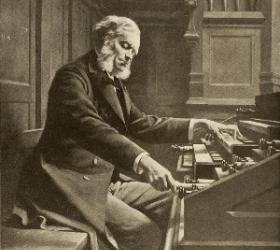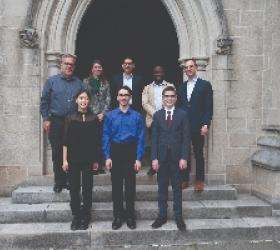
Leonard Edwin Bearse Sr. died in Amesbury, Massachusetts on May 4, at the age of 73. Born in Hyannis, Bearse had his first church job at age 14, at the First Baptist Church there. He studied the organ in Germany while serving with the Armed Forces there, and studied choral conducting with Robert Shaw. He earned a master of music degree from the New England Conservatory of Music in Boston, studying organ with Donald Willing. He was a public school teacher in various eastern Massachusetts towns, and held music positions in various churches, most recently as minister of music at the Congregational Church in Kensington, New Hampshire, where he played his last service on March 16. Leonard Bearse is survived by his wife, Ellen, and his children Leonard E. Jr., Bruce, and Stephanie.
Michael Cohen, age 69, died June 21 in Asheville, North Carolina. A native of Tampa, Florida, he earned bachelor’s and master’s degrees in music from Florida State University–Tallahassee. He taught music in the Florida public schools for 39 years, and was organist-music director for the Church of the Holy Spirit in Apopka, Florida, for the past 17 years. A past dean of the Central Florida AGO chapter, he was a member of the Winter Park Bach Festival Choir. Michael Cohen is survived by his partner, Carl Brown; his brother Paul (and wife Donna), and brother Joel (and partner Barry Dingman).
Robert E. Glasgow, Professor Emeritus at the University of Michigan School of Music, noted concert organist, and one of the most widely respected artists in the field of organ performance and pedagogy, died on September 10 in Ann Arbor, Michigan. He was 83.
Professor Glasgow taught organ at the University of Michigan School of Music for 44 years. He received his B.M. and M.M. degrees from the Eastman School of Music in 1950 and 1951, respectively, earning Eastman’s Performer’s Certificate as well. At Eastman, he studied with Harold Gleason. From 1951 to 1962, he was associate professor of organ and college organist at MacMurray College in Jacksonville, Illinois. He joined the University of Michigan School of Music in 1962 as assistant professor, and was promoted to associate professor in 1964, full professor in 1973, and professor emeritus in 2006.
In 1973, Glasgow was awarded the Doctor of Musical Arts degree, honoris causa, by MacMurray College in Jacksonville, Illinois. The New York Chapter of the American Guild of Organists named him International Performer of the Year for 1997. Glasgow returned to his alma mater in January 2002, where he was given the school’s Alumni Achievement Award. On the same occasion, he taught a masterclass, influencing yet another generation of Eastman students. Glasgow’s faculty colleagues at the University of Michigan also recognized his pedagogical efforts by awarding him the Harold Haugh Award for excellence in the teaching of performance.
For over 50 years, he successfully combined a brilliant teaching career with an impressive career as a concert organist, both in the United States and abroad. He was best known for his stirring performances of the organ literature of the 19th century, and was regarded by some as the greatest living interpreter of Romantic organ music. He was a regularly featured performer for national and regional conventions of the American Guild of Organists as well as the International Congress of Organists. He was selected to perform and teach at the American Classic Organ Symposium on the occasion of the completion of the renovation of the great Tabernacle Organ at the Church of Jesus Christ of Latter-day Saints in Salt Lake City, Utah.
Dr. Glasgow’s performances of the music of Liszt, Mendelssohn, Schumann, Widor, Vierne, and especially César Franck were legendary; in one review he was given the appropriate nickname “the Philadelphia Orchestra of Organists.” In addition to a number of broadcast recordings for the BBC, Glasgow made one commercial recording for Prestant Records in 1987, Robert Glasgow plays César Franck, recorded on the Aeolian-Skinner organ in All Saints Church, Worcester, Massachusetts.
A leading educator of uncompromising standards, Robert Glasgow helped to form some of the most gifted organists in the world. His students are to be found in important church and academic positions throughout the United States. He was an artist in the truest sense, and a teacher who constantly reminded his students that they must not strive merely to be organists, but always musicians— communicating musical ideas in spite of the inherent difficulty of the instrument.
Robert Ellison Glasgow was born on May 30, 1925 in Oklahoma City, Oklahoma, the son of Floyd Lafayette Glasgow and Elizabeth Mary Jenkins. His death is mourned by his many devoted students, friends, and colleagues. (See the interview with Stephen Egler, “Robert Glasgow at 80,” The Diapason, May 2005.)
—Ray Henry
Rochester, Michigan
Walter A. Guzowski died September 17 in Fort Lauderdale, Florida. He was 68. Born and raised in Buffalo, New York, his career had a dramatic beginning. While still a high school student, he observed an organ technician tuning the Schlicker organ at his church, and informed the pastor that he could do what the technician had done, and save the church some money. Later, while doing some tuning, Guzowski slipped off the walkboard onto the chest below, crushing numerous pipes; to rectify this, his father brought him to Herman Schlicker, and Guzowski began working at the Schlicker Organ Company, where he worked (except for two years serving in the Army) until 1979. While at Schlicker he became head voicer and tonal finisher, working on a range of instruments, from two-rank residence organs to the large organ at First Congregational Church in Los Angeles. After moving to Fort Lauderdale in 1979, he founded a service business, which with John A. Steppe and Christopher B. Kane, became Guzowski & Steppe Organbuilders, Inc. in 1983. Walter Guzowski is survived by his sister Margaret, her husband Walter, and cousins and friends.
Gerhard Krapf died in Edmonton, Alberta, Canada, on July 2. He was 83. Krapf was renowned for his organ, choral, and vocal compositions, his scholarly writings on the organ, his teaching at the University of Alberta (1977–87, for which he was named professor emeritus), and for designing the 1978 Casavant organ there. He contributed significantly to the development of graduate programs in keyboard and library resources at the University of Alberta; in the 1960s, he had established and built the undergraduate and graduate organ programs at the University of Iowa’s School of Music. Gerhard Krapf is survived by his wife, Trudl, three daughters, a son, a brother, sister, and four grandchildren.
John S. Peragallo, Jr. died Friday, September 12 at the Hospice of New Jersey, Wayne, New Jersey, at age 76. Born in New York City and a lifelong resident of Paterson, he took several classes at the Newark College of Engineering, and served in the U.S. Army during the Korean Conflict as a chaplain’s assistant and in the honor guard.
As a boy he helped his father in the family business, the Peragallo Pipe Organ Company, founded by his father, John Peragallo, Sr., in 1918. John Jr. joined the company in 1949. He was responsible for the construction and care of many of the pipe organs of New Jersey and the complete renovation of the organs at St. Patrick’s Cathedral, New York City. John Jr.’s sons, John III and Frank, have been actively involved in the family business since the 1980s and now have a fourth generation of Peragallos, Janine, Anthony and John IV, to work alongside them. The company has installed almost 700 new instruments and currently maintains approximately 400 instruments, up and down the East Coast of the United States, including the organs of St. Patrick’s Cathedral in New York.




